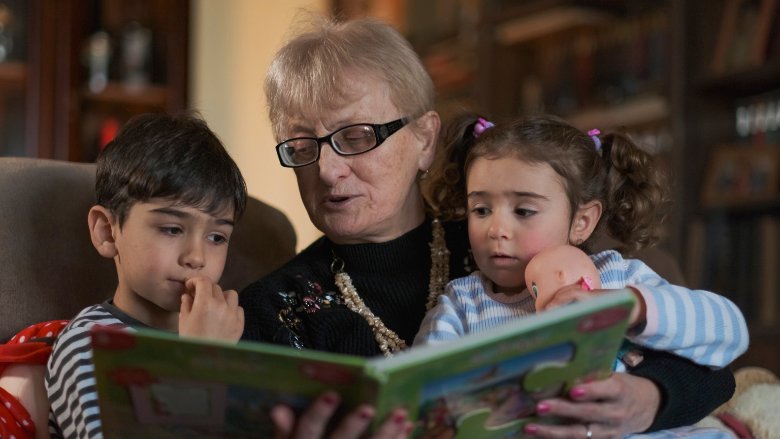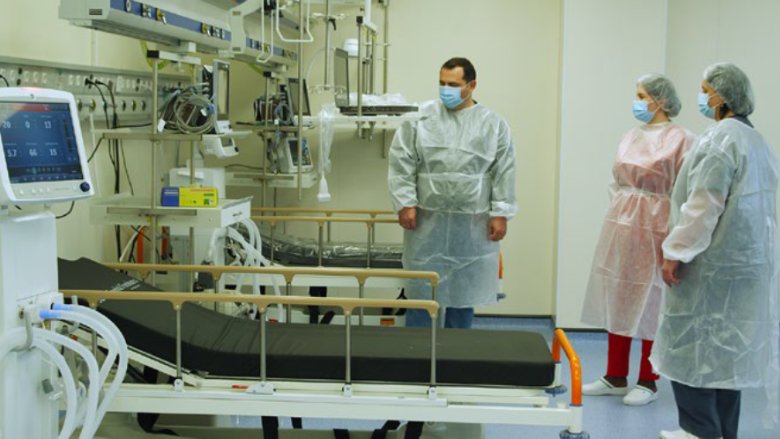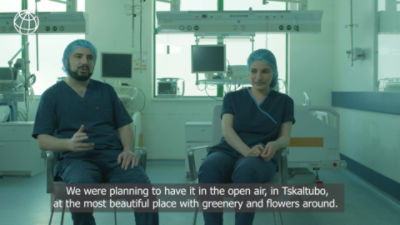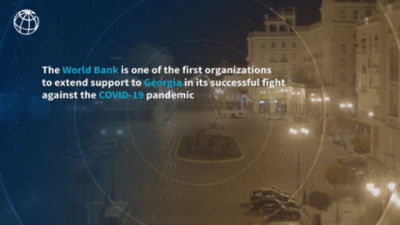Beneficiary
“During the period of restrictions, when my family’s income was seriously affected, with support of the government, we survived. With this financial support, I was able to buy essential food, essential sanitary items, and avoid selling my house,” A 64-year-old grandmother from the small town of Chiatura in western Georgia .
"For months during the pandemic the only protection for the older generation was isolation. Vaccination allowed us to return to normal life," Rusudan Akhalaia from Kareli municipality of eastern Georgia.
‘The health care infrastructure, put in place during the pandemic, is not limited to helping fight against COVID-19. In the long run, it will support the country to better manage its primary health care and hospital level services,” Ilia Ghudushauri, Deputy Minister, Ministry of Internally Displaced Persons from the Occupied Territories, Labor, Health and Social Affairs of Georgia.
Challenge
Georgia has been heavily affected by COVID-19, and from early in the pandemic it was clear that the most vulnerable would be hit hardest. The first case of COVID-19 in Georgia was detected on February 26, 2020. Nearly three years later, the country had registered 1.8 million confirmed cases of COVID-19 and 16,934 deaths. The pandemic brought about a GDP reduction of 6.2% in 2020, an increase of those under the poverty line (from 42% to 46.6%) and a massive increase in unemployment (at least 350,000 people qualified for government assistance of about $60 per month for six months due to temporary or permanent job loss in the first half of 2020).
From the onset of the crisis, the Government of Georgia was concerned about the pandemic’s impact on people with less access to resources and those living in poverty, particularly the disabled and socially excluded. Unless concerted action was taken, the COVID-19 pandemic was likely to intensify inequality in Georgia and increase the number of vulnerable people.
Approach
The World Bank was one of the first development partners to support the Government of Georgia during the COVID-19 pandemic. The Georgia Emergency COVID-19 Response Project was designed to mitigate the health and social impacts of the pandemic, support medical and emergency personnel to manage COVID-19 (particularly in elderly people with chronic health conditions), and protect poor and vulnerable families who lost jobs or incomes due to the pandemic. The project financed essential packages of equipment, supplies, medicines, and vaccines to respond to the COVID-19 pandemic. In addition, 62% of people in the poorest quintile received either ordinary or temporary social assistance to cope with the impact of the pandemic.
To address the challenge of ensuring vaccine access, deployment, and acceptance, the government requested additional assistance, and the World Bank again was the one of the first institutions to respond with support for Georgia’s national vaccination campaign. Project-backed communication and outreach support services put a special focus on communication/information awareness in the regions and specifically on ethnic minority groups. For this purpose, the project supported the development of slogans for the vaccination campaign and vaccination-related video clips for TV advertisement, and information awareness sectoral meetings.
Results
The project’s priority was to save lives and protect health workers. By November 2022, the project financed procurement and distribution of:
- 7 million COVID-19 PCR and rapid antigen tests
- 12 million personal protective equipment purchased for health workers and other personnel
- 2.4 million WHO-qualified syringes to administer Pfizer vaccines, and 1.25 million Pfizer vaccine doses
- 2,000 Vials of Tocilizumab, 70,000 packs of Remdesivir, 500 combo packs of Ronapreve and 80 vials of Immune Globulin to treat COVID-19 patients
- 38 B- and C-type fully equipped ambulances, among them five ICU vehicles, and 41 medical emergency motorcycles accompanied with safety gear, Information Technology equipment, and a Tetra Radio Transmission System (with dispatcher console units and portable vehicle and radio systems for the Emergency Situations Coordination and Urgent Assistance Center. The latter enabled that center to communicate with ambulances nationwide.
- Equipment for seven public hospitals (three major hospitals located in the capital Tbilisi, four regional hospitals) that included:
- Four body plethysmography equipment with spirometers
- Eight central monitoring systems
- 321 patient monitors
- 102 infusion pumps
- 21 defibrillators
- 101 stretchers
- 220 electric intensive Care Unit (ICU) beds
- 250 mechanical hospital beds
- Two high-tech computer tomography system machines
- One digital X-ray fluoroscopy
- Two stationary X-ray systems
- Four mobile X-ray machines
- 15 ultrasounds
- Two neurology microscopes
- 36 dialyses machines
- 14 cardiograph machines
- 37 pulmonary ventilators
The project also supported the development of the country’s Cold Chain Temperature Monitoring Plan in line with the Effective Vaccine Management standards. Under the project, regular visits to National Immunization Providers are conducted to document potential problems and identify appropriate control measures.
In parallel with efforts to mitigate the health impacts of the pandemic, the project also addressed the economic and social impacts of the crisis on the most vulnerable. By October 2022, the project had provided about $48 million from IBRD financing alone, with $108 million in total with AIIB co-financing, for temporary emergency benefits for vulnerable households, temporary unemployment benefits, and one-time benefits for self-employed individuals. These cash transfers helped to support: 108,577 vulnerable households relative to the project target of 70,000; 239,508 formal private sector workers who were laid off because of the COVID lockdown received temporary employment benefits -- almost twice the target of 135,000; and 368,693 informal workers received the one-off cash benefit compared to the target of 340,000.
Bank Group Contribution
Working closely with development partners, the World Bank mounted a significant COVID-19 response to help the government of Georgia swiftly address the impacts of the crisis. The project was financed by a $80 million loan from the World Bank and co-financing of $100 million from the Asian Infrastructure Investment Bank (AIIB).
Partners
The AIIB and other development partners have been active in supporting Georgia respond to COVID-19. The United Nations (UN) Resident Coordinator Office supported the establishment of the “health procurement group bringing together UN Agencies, the World Bank, and Georgia’s health authorities to harmonize assistance across participating institutions based on the commodity lists elaborated with technical support from World Health Organization (WHO) technical expertise. The WHO provided technical assistance to the government of Georgia on its preparedness and response efforts, while deliveries of medical commodities to hospitals were funded by United States Agency for International Development (USAID), the European Union (EU), and the United Nations Development Program. USAID provided $10 million through various implementing agencies such as the International Federation of the Red Cross, UNICEF, and WHO. The European Investment Bank allocated EUR 200 million to develop health care infrastructure in Georgia and respond to its fiscal and other needs during the pandemic while the EU COVID-19 Solidarity Program for the Eastern Partnership provided EUR 2 million through WHO. In addition, the Japanese Government and Asian Development Bank supported COVID-19 Emergency Response Projects, totaling $2.5 million. With regard to mitigating the economic and social consequences of COVID-19, the UN High Commissioner for Refugees supported refugee communities under an expanded cash assistance program, and UNICEF provided food to Roma families.
Looking Ahead
Before the COVID-19 pandemic, the World Bank had not had a lending operation in the health sector in Georgia for almost a decade. Following the COVID-19 Emergency Response projects, the World Bank’s health team, together with colleagues from the education and social protection sector, prepared a human capital-oriented project. This project aims to unlock the country’s growth potential through investments in health, education, and social protection. This is the largest World Bank project ever extended to Georgia during three decades of partnership, and the project represents the World Bank’s first cross-sectorial operation comprehensively targeting three critical areas of human development.
Multimedia
A Wedding on Hold: Coronavirus Stories from Georgia
World Bank Supports Georgia with Rapid Response to Coronavirus



